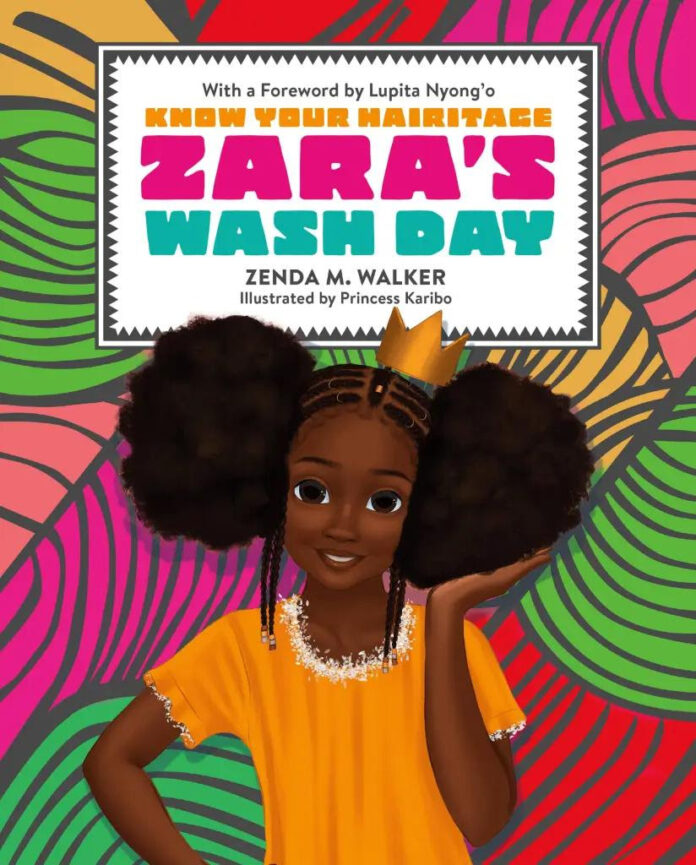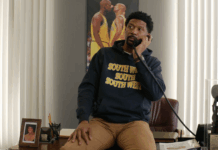( ENSPIRE Health & Wellness ) Zenda Walker Is Passionate About Beauty Education
ENSPIRE Contributor: Shaterra Williams
In a world where stories have the power to uplift and inspire, Zenda Walker stands as a beacon of creativity and empowerment. A celebrated author and licensed cosmetologist, she has embarked on a remarkable journey with her innovative series, “Know Your Hairitage.” This initiative, published by Running Press Kids, is more than just a collection of books; it is a heartfelt celebration of Black heritage viewed through the enchanting lens of textured hair.
ENSPIRE recognizes the importance of spreading this empowering message to its audience by highlighting Zenda’s commitment to positivity and self-acceptance and aiming to reinforce the value of embracing one’s identity. In a world where diversity should be celebrated, Zenda’s stories enrich the literary landscape and inspire a new generation to take pride in who they are.

How do you bridge the gap between your ‘Know Your Hairitage’ series and your work in classrooms, and what specific impact have you seen your books have on students’ understanding of Black hair and cultural pride?
My ‘Know Your Hairitage’ series, including ‘Zara’s Wash Day’ and ‘Zion’s Crown, serves as a vibrant launchpad for deeper classroom conversations. I’ve designed these stories to be more than just narratives; they’re tools for fostering cultural pride and dismantling harmful stereotypes surrounding Black hair. In classrooms, I use these books as springboards for interactive discussions about hair texture, historical significance, and the beauty of diversity. I’ve witnessed firsthand the transformative impact: students initially hesitant about their natural hair begin to embrace it with newfound confidence.
They learn that their hair is not just a physical attribute but a powerful expression of their heritage. The books spark critical thinking about representation and encourage students to challenge negative narratives they may have internalized. Teachers have shared stories of students proudly sharing their hair stories, creating a safe and inclusive space for self-expression. For more examples of all the content and curriculum I created inspired by hairitage, check out the Know Your Hairitage Education Brochure at www.knowyourhairitage.com.
In your experience, what’s been the most challenging aspect of writing these stories in a way that resonates with young readers while also conveying the historical and cultural significance of their ‘hairitage’?
The most challenging, yet rewarding, aspect is balancing accessibility with depth. I aim to create engaging and relatable stories for young readers, but I also want to ensure they grasp the profound historical and cultural significance of Black hair. It’s a delicate dance between simplicity and complexity. I strive to weave historical context and cultural nuances seamlessly into the narrative, using vibrant illustrations and relatable characters.
To achieve this, I conduct thorough research and collaborate with cultural consultants, ensuring accuracy and authenticity. The goal is to make learning about hairitage an adventure, not a lecture. I want young readers to feel empowered and inspired, not overwhelmed. Understanding the nuances of Black hair history requires careful storytelling, which you can explore through my books. I also include “show and tell” elements in my presentations and have even designed hands-on activities so students can apply the lessons in real time.
Beyond reading a story, what key messages do you hope young readers and their families will internalize from the ‘Know Your Hairitage’ series, particularly in fostering self-love and challenging negative narratives surrounding Black hair?
My ultimate goal is to cultivate self-love and dismantle the negative narratives that historically surround Black hair. I want young readers and their families to internalize that their hair is beautiful, versatile, and a source of pride. I hope they understand that their hair connects them to their ancestors and celebrates their unique identity. The ‘Know Your Hairitage’ series encourages readers to embrace their natural hair, challenge societal beauty standards, and foster a deeper appreciation for their cultural heritage. I want to empower them to be confident in their skin and celebrate Black hair’s diversity. These stories are a tool for building positive identity formation and promoting cultural acceptance.
Can you share a specific personal experience or memory that inspired a particular scene or character in either of these books and how that connection enriches the story?
In “Zara’s Wash Day,” the scene where Zara learns about the historical significance of braids was inspired by my childhood experiences. I remember my grandmother telling me stories about how enslaved Africans used braids as maps and communication tools. That revelation sparked a sense of pride and connection to my ancestors.
Also, the scene in “Zion’s Crown” where Zion tells his father that he wants to take out his cornrows after being bullied on the school bus is inspired by my daughter and my experience of wanting to change our aesthetic due to bullying.
Zion’s father taking him on a historical journey to help him understand the important history of braids, locs, and Afros instilled a sense of pride—a foundation. I wanted to recreate that feeling for young readers. By incorporating these personal experiences, I add authenticity and emotional depth to the stories, making them more relatable and impactful. These are not just stories. They are lived experiences that are being shared.
You’ve received endorsements from luminaries like Lupita Nyong’o and Dr. Ibram X. Kendi. Can you describe a particularly memorable interaction you’ve had with a reader or a piece of feedback you’ve received that highlighted the impact of your books on their sense of identity and pride?
One of the most memorable interactions was with a young girl who approached me at a book signing. She shyly showed me her natural hair, which she had previously tried to straighten. She told me that after reading “Zara’s Wash Day”, she felt empowered to embrace her curls. Her mother shared that the book had sparked conversations about hair positivity within their family, and they were now exploring different natural hairstyles together. That moment solidified the impact of my work. Knowing that these stories are helping young readers and their families embrace their natural beauty is incredibly rewarding.
What was the most rewarding moment you experienced when creating these books, knowing they contribute to a more positive and empowering representation of Black culture?
The most rewarding moment was seeing the finished books in the hands of young readers. Knowing that these stories contribute to a more positive and empowering representation of Black culture is incredibly fulfilling. I poured my heart and soul into these projects, and to see them resonate with children and families is truly special. It’s about more than just selling books; it’s about creating a legacy of cultural affirmation and empowerment.

Whenever I see a child’s face light up as they recognize themselves in the pages, I know I’ve achieved my mission. These stories are a testament to the beauty and resilience of Black culture. Buying these books, writing good reviews, and supporting authors help persuade publishers that audiences also want and need this content.
Zenda Walker is transforming the literary landscape, one story at a time, reminding us all that when we know our heritage, we find strength in our roots. Let us celebrate this journey and stand together in the beauty of diversity, inspiring future generations to shine brightly in their own unique ways.
Related Articles: Dionna Owens: Founder of Sew Natural Hair Boutique Giving Guide for Healthy Hair Habits, Veteran Eric Dominijanni Presents Black-Owned Fior Scotch Business







